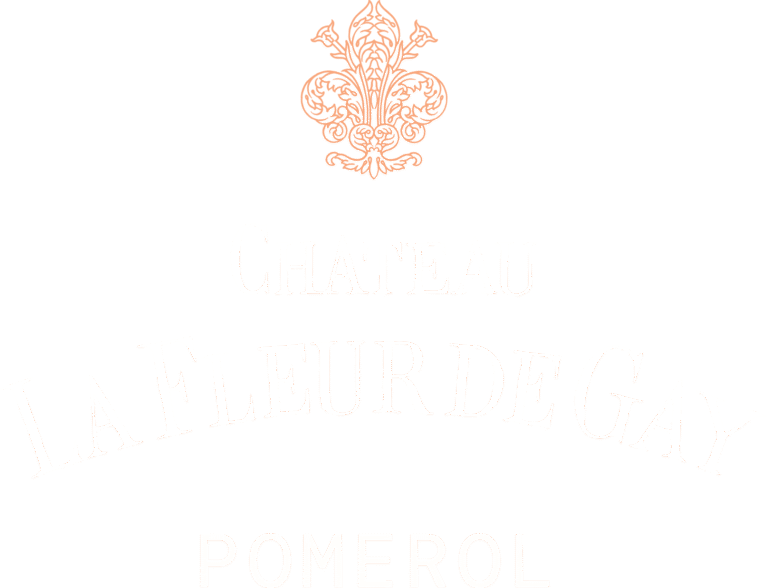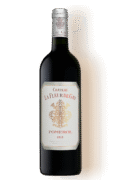
The Raynaud-Lebreton family, winegrowers since 1772
One of the greatest terroirs of Bordeaux vineyard
Three plots in the heart of the upper terrace of Pomerol are an exclusive blend of unique terroirs: the pure blue clay of the Pétrus area (the ‘Lafleur’ parcel), the deep gravel soils neighbouring Château Lafleur (the ‘Gay’ parcel) and the high-graining gravel soils of the Château Trotanoy and Le Pin area (Groupey plot).
Visit us

Groupey parcel 1,21 ha
High terrace of Pomerol
High graining gravels on blue clay subsoil
Lafleur parcel 0,15 ha
High terrace of Pomerol
Pure blue clay soil and subsoil
Gay parcel 1,08 ha
High terrace of Pomerol
Thick layer of gravels on blue clay subsoil
Groupey parcel
High terrace of Pomerol 1,21 ha
Between Le Pin (Pomerol) and Château Trotanoy, which it adjoins to the north-west, this plot offers Merlot (4,875 vines) and Cabernet Franc (2,059 vines) the combination of two exceptional ‘terroir elements’: a layer of gravels with exceptionally high grain size but moderate thickness (1.5 to 2.5 meters) covering a nearby subsoil of pure blue clay and a discreet and original south-facing slope (between 34 and 35 meters above sea level). The unique combination and proximity of this topography, these sun-drenched gravels and this cool subsoil allow the Merlot grape variety to express itself with exceptional elegance. The Cabernet Franc grape variety, which is demanding in terms of water supply, finds in this rather unique location in Pomerol one of the rare areas of the appellation where it achieves a full and deeply original expression.


Lafleur parcel
High terrace of Pomerol 0,15 ha
Between Pétrus (Pomerol) and Château Lafleur-Pétrus, this 0,15 hectare plot of pure blue clay on the high terrace of Pomerol, on a gentle north-facing slope at an altitude of between 35 and 36 meters, is home to 809 Merlot vines. The grapes from this plot bring the unique complexity of the Pétrus area to the blend of Château La Fleur de Gay.


Gay parcel
High terrace of Pomerol 1,08 ha
Overlooking Château Lafleur (Pomerol) at an altitude of 37 meters, this discreet but superb hilltop of deep gravel (a 5 to 8 meters thick layer of gravel covering pure blue clay subsoil) is the historical origin and heart of the Château La Fleur de Gay blend. This is where it draws its extraordinary density. 6,686 Merlot vines offer an absolutely unique expression here, probably one of the most distinctive of this grape variety.


Gay : 1,08HA
Deep gravels soils neighbouring Château Lafleur
Groupey : 1.21 hectares
High graining gravels from the Château Trotanoy and Le Pin area
Lafleur : 15 Ares
Pure blue clay from Pétrus area
THE WINE COLOUR
‘DROITE-EPINE’
The unique style of Château La Fleur de Gay is characterised by its smoothness, flavour and exceptional sapidity, which linger on the palate. This singular style, largely forgotten but eminently Bordeaux, is the result of absolute respect for its terroirs of origin. Ancient gravels and pure blue clay from the highest terrace of Pomerol shape this unique wine. Touching the senses and achieving the only true luxury, that which provides tangible pleasure, is the prerogative of the greatest terroirs.


FROM ‘CRU DE GAY’ TO CHATEAU LA FLEUR DE GAY
Initiated by our ancestor Jean-Henri Angle as Cru de Gay, named after the discreet but superb gravelly hill overlooking Château Lafleur, the exceptional character of Château La Fleur de Gay’s vineyard has been recognised since the 19th century.
Still structured around the extraordinary power of the Merlot grapes from this Gay plot, the blend of Château La Fleur de Gay has become more complex, with the superlative finesse of the Merlot grapes and the unique expression of the Cabernet Franc grapes from the Groupey parcel, spiced with the unique character of the pure clay from the Lafleur plot.
« “LUXURY IS A MATTER OF MONEY. ELEGANCE IS A MATTER OF EDUCATION.” »
The terroirs of Château La Fleur de Gay are able of producing one of the greatest wines in Bordeaux, ‘equal of Pétrus in terms of intensity and complexity’ according to Robert Parker, or ‘with a richness of texture and an aromatic brilliance that is infinitely superior – in our opinion – to Le Pin’ according to Michel Bettane.

« The purity and intensity of flavours, a concentration hidden beneath an appearance of lightness: this is my conception of the beauty of a contemporary wine. »
« I like sensitive, poetic wines that resonate with the sensibilities of tasters… »




